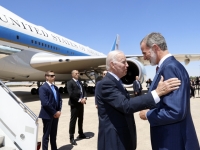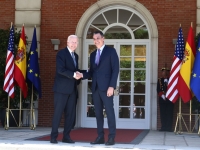Politics
The King of Spain receives “the partner, ally and, above all, friend” Joe Biden
More destroyers will be sent to Rota
USPA NEWS -
The King of Spain, Felipe VI, accompanied by the Minister of Foreign Affairs, José Manuel Albares, and the Minister of Defense, Margarita Robles, received the President of the United States of America, Joseph R. Biden Jr., on Tuesday at the Torrejón Air Base. Biden travels to Spain for the first time to attend the acts of the 32nd NATO Summit. President Biden landed in Madrid from Germany, where he has attended the G7 Summit.
The NATO Summit brings together at the IFEMA Fair in Madrid, between June 29 and 30, nearly 40 heads of State and Government, coinciding with the 40th anniversary of Spain's accession to the North Atlantic Treaty Organization. Among the attendees are the 30 allied countries, four invited Asia-Pacific countries (Australia, New Zealand, Japan and South Korea), four other member countries of the European Union but not of the Alliance, as well as the heads of the European Commission and the European Council.
The King held a bilateral meeting with the President of the United States, Joseph R. Biden Jr., who is traveling to Spain to attend the NATO Summit events. The King stated that "it is a great satisfaction for me to welcome to Spain the President of the United States of America, Joseph Biden, on this his first visit to our country as President of the great North American nation," a country that Felipe VI described as a "first level ally, economic and commercial partner and, above all", he emphasized, "a friendly country." After his speech, President Biden thanked Felipe VI for his words before both addressed the Official Chamber, where he had at the end of the meeting, the King bid farewell to Joseph R. Biden Jr. at the Prince's Gate.
Previously, President Biden had met at the Palacio de la Moncloa with the President of the Spanish Government, Pedro Sánchez. The meeting between the two leaders "expresses the excellent bilateral relationship between Spain and the United States, allied countries, strategic partners and friends, united by strong historical roots and close collaboration on numerous issues of shared interest, with a common desire to preserve and promote the values of freedom, democracy, human rights, gender equality and the rule of law,” according to a statement from the Palacio de la Moncloa.
In this context, the two presidents have agreed that Spain and the US adopt a new Joint Declaration - the previous one dates back to 2001 -, which will update and further strengthen the existing strategic relationship between the two countries. The Spanish Prime Minister, Pedro Sánchez, said he felt "particularly satisfied" with the new Declaration, in which Spain and the United States undertake to deepen their already close cooperation on security and defense matters, while reaffirming their commitment to safeguarding the rules-based international order, in the face of the violation of international law and the attack on shared values that the Russian invasion of Ukraine has brought about.
For the President of the Spanish Government, the aggression by Russia "confirms the need to redouble this commitment," expressed in the renewed Joint Declaration, in which Spain and the US express their determination to "strengthen multilateral responses to transatlantic challenges and condemning Russia's unjustified and unprovoked war against Ukraine, which has fundamentally altered the global strategic environment" and constitutes "the most direct threat" to transatlantic security and global stability "since the end of the Cold War."
East and South flanks
One of the main consequences of Putin's war has been the revitalization of the Atlantic Alliance. With the security of Europe at stake, all the allies - including Spain - have responded decisively by reinforcing the Eastern flank, while also recognizing the threats coming from the southern flank and the need, in the words of Pedro Sánchez, "for the Alliance has a 360-degree approach." For his part, Joe Biden described Spain as an "indispensable partner" within NATO.
In this framework, both leaders discussed the interest of the United States in increasing its military presence at the Rota naval base with the aim of strengthening the collective security of the Alliance. They also addressed what President Sánchez described as "the increasingly prominent challenges in the Sahel," also expressing in the Joint Declaration the will of Spain and the United States "to address irregular migratory flows with a comprehensive approach," while recognize "the importance of permanent cooperation in the face of the challenges of this irregular migration in North Africa." In this regard, President Biden underlined "his desire to work together in Africa to ensure growth and stability."
Along with this, both leaders analyzed China's role in the current geopolitical context, reiterating their willingness to continue working together in multilateral forums - such as the United Nations and the G20 - to promote a coordinated response to global challenges, such as the climate emergency, food security or global health architecture. The Joint Declaration also includes the commitment of both countries to strengthen cooperation ties in the fields of justice, cybersecurity, energy security - President Sánchez thanked the important supply of gas from the US to Spain at a time of intense global tensions in the energy markets due to the war -, the technological and scientific spheres, among others.
Liability for this article lies with the author, who also holds the copyright. Editorial content from USPA may be quoted on other websites as long as the quote comprises no more than 5% of the entire text, is marked as such and the source is named (via hyperlink).







